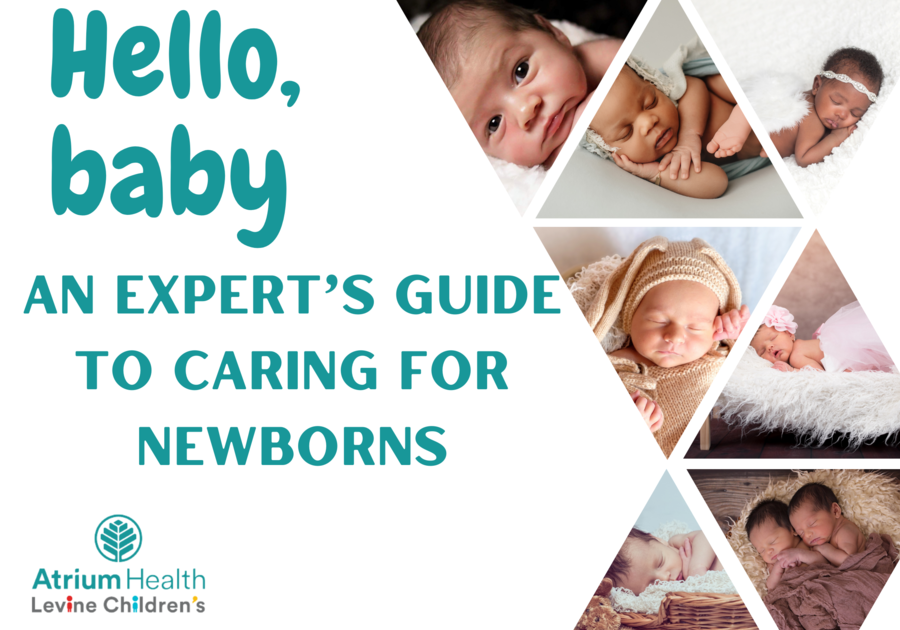Whether you have a newborn or are expecting one soon, you may be feeling overwhelmed with all the information you didn’t know you’d need to know. Unfortunately, babies don’t come with an “owner’s manual” or a “user's guide.” But it may help to know that you're not alone. Our friend, Dr. Abby Werner, a pediatrician with Atrium Health Levine Children's Charlotte Pediatrics, has heard a myriad of questions from many sleep-deprived parents over the years. To help put your mind at ease, we asked Dr. Werner to share her answers to some of the most common concerns.

Feeding
My baby spits up right after finishing a bottle. Is this concerning?
“This is the messy, but normal, reality of feeding infants,” Dr. Werner says. “A baby's stomach is only as big as their tiny fist, so they can only fit so much milk in at a time. To make things more complicated, the muscle at the top of a baby’s stomach is loose, so it is easier for liquid to overflow back up – meaning it may seem like more is coming up than going down.”
Dr. Werner says spitting up isn't typically a reason to be concerned. But reach out to your baby’s pediatrician if the spit up is dark green or bloody, if the baby looks uncomfortable during actual feeds, if they aren’t gaining weight or growing or if the spit up is projectile.
Should I feed my baby more often if they are spitting up a lot?
“In general, newborns need to eat every 2-3 hours,” Dr. Werner says. “This ensures they get enough nutrients in their system over the course of the day to grow adequately and keep blood sugar levels stable.”
Dr. Werner says the best way to gauge that your infant is getting enough milk throughout the day is by their growth and their output. She says an easy way to keep track is by the number of wet diapers per the number of days old they are (one diaper in the first 24 hours of life, two on the second day, etc.) up through day six. After that, as long as they make at least six wet diapers every 24 hours, you can feel confident they are getting enough to grow.
Is breastfeeding the best way to feed my child? I have heard that formula doesn’t have all the nutrients they need to develop.
“Breastfeeding is wonderful if it works for you. But formula is also a great option,” Dr. Werner says. “Breast milk has all the nutrients an infant needs, and contact with a mother's skin offers benefits from microbial transfer and bonding. However, breastfeeding and/or pumping may not work for all families.”
Dr. Werner says adequate infant-mother bonding can happen naturally with skin-to-skin contact at other times, including bottle feedings. Plus, with formula and bottle feedings, fathers and other caregivers can share in the joy of feeding the baby.
“Having a newborn can be stressful enough. If breastfeeding becomes its own source of anxiety, babies can pick up on the anxious vibes,” Dr. Werner says. “What’s most important is to go with what works best for you and your baby. We support you however you choose to provide for your family.”

Sleeping
If my baby goes to bed later, will she sleep later?
“Infants can become over-tired and have even more difficulty falling asleep if they are awake for too long,” Dr. Werner says. “Routines are important for babies. It is best to pay attention to their wake windows and support them in developing healthy sleep routines as they show signs of sleepiness.”
Dr. Werner says newborns will typically wake around similar times regardless of when they go down due to internal hormonal cues such as hunger, or external cues.
Are sleep regressions linked to major developmental milestones?
“Several factors can wake an infant or toddler that are not associated with true regressions,” Dr. Werner says. “Some sleep regressions are recognized patterns, such as the 4-month sleep regression where the brain is transitioning away from neonatal sleep cycles. But teething, growth spurts and sickness can also cause some rough nights along the way.”
Dr. Werner says it is easier to get back on track if there is a solid schedule foundation.
“You can address these challenges however best for your family, and sometimes different approaches work better than others at different times. But ultimately it is important to establish routines so babies learn what to expect,” Dr. Werner says. “This also helps set them up for success to learn to comfort themselves when they wake up overnight.”
Meaning: you can hopefully get a little more shut-eye as baby learns and adapts to the schedule you set.
My baby makes a lot of noise in his sleep. Should I get him up right away if he starts to make noise?
“Babies are very noisy when sleeping,” Dr. Werner says. “If they sound like they're awake, give them a few moments to see if they settle back to sleep. Until about 4 months old, babies have very active sleep cycles. Sometimes they cry and move around and sound like they're awake, but their eyes are only partially open.”
If I give my baby a pacifier, they won’t breastfeed or sleep through the night.
“Most babies don't have any confusion between a nipple and a pacifier. And the sucking reflex is calming to infants,” Dr. Werner says. “This is very much a personal choice. Some babies aren't interested. For those who love the pacifier, they are looking for something soothing for comfort.”
Dr. Werner says infants may use their mother as a pacifier, but this can cause a lot of stress and add to maternal exhaustion. So pacifiers can help soothe the baby and give the mother a break.

Breathing
My baby takes several fast breaths in a row then holds her breath for a few seconds. Is this unusual?
“It is normal for babies to have irregular breathing,” Dr. Werner says. “This irregular pattern is called periodic breathing. It is very common and not dangerous. As long as they are breathing comfortably, albeit a little noisy, they are perfectly safe.”

Developing
I feel like all my baby does is eat, sleep and poop. When can I feel like he is actually interacting with me?
“The first few weeks (or months!) may feel monotonous,” Dr. Werner says. “But babies are seeing, smelling, hearing, and making neural connections at the highest rates of their life.”
Werner says having basic needs met (food when hungry, clean diapers when dirty, warmth, and stability) lays the groundwork for more complex associations as they grow.
“Babies are subconsciously learning about their environment at every moment. In a few short months they'll start reflecting back,” Dr. Werner says. “That first social smile is such a bright spot for parents to enjoy some reciprocity, but truly the infant has been taking in their world from the moment they made their entrance.”
If you have more questions or concerns about your newest addition, connect with an Atrium Health Levine Children’s pediatrician near you.
Dr. Werner is board certified in general pediatrics and pediatric hospital medicine. She is an assistant professor at Atrium Health Levine Children’s Hospital and Jeff Gordon Children's Center. Outside of work, Dr. Werner and her husband, Josh, enjoy spending time with their 2 children. They like traveling to the mountains, going for bike rides, trying new restaurants and attempting new recipes at home.

Connect with Atrium Health Levine Children's





